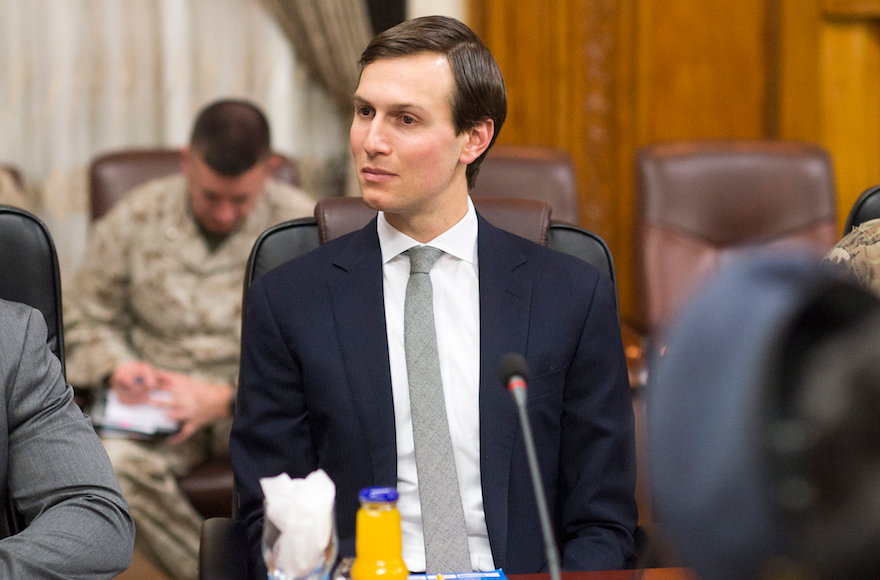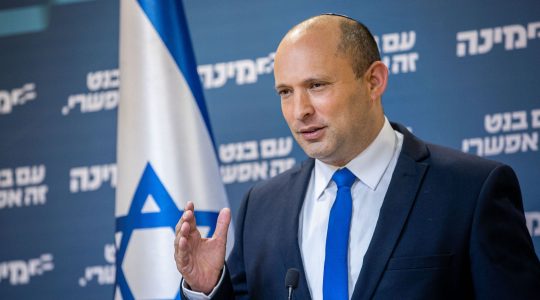WASHINGTON (JTA) — President Donald Trump wants to forge an Israeli-Palestinian peace deal, but he and his top officials appear to be determined to first reframe the parameters of the conflict.
What’s unclear is if the radical changes in policy, spearheaded by Jared Kushner, Trump’s son-in-law and senior adviser, will bring Palestinians back to the peace table, or cripple any prospects for peace.
Since Trump assumed office he has jettisoned a number of orthodoxies that for years defined U.S. administration policy, whether Democratic or Republican: He retreated from the two-state solution, he recognized Jerusalem as Israel’s capital, he slashed funding to the Palestinians and he has trained rhetorical fire on the Palestinian Authority.
Now his administration looks set to embrace a much narrower definition of Palestinian refugee than the one accepted by the U.N. agency that delivers aid to the Palestinians, UNRWA.
Trump’s national security adviser, John Bolton, told Reuters last week that UNRWA and its definitions were in the Trump administration’s sites.
“UNRWA is a failed mechanism. It violates standard international law on the status of refugees,” Bolton said. “UNRWA’s program is the only one in history based on the assumption that refugee status is hereditary, and I think it is long overdue that we have taken steps to reduce funding.”
Bolton said UNRWA’s perpetuation of refugee status was a mistake.
“Much of UNRWA’s expenses really go to perpetuating the refugee status of the Palestinian people, and I think that’s a mistake,” he said. “I think it’s a mistake from a humanitarian point of view … a perpetuation of an unnatural status.”
UNRWA defines Palestinian refugees as “persons whose normal place of residence was Palestine during the period between June 1 1946 and May 15 1948, and who lost both home and means of livelihood as a result of the 1948 conflict.” It serves some 1.5 million people in 58 recognized Palestinian refugee camps.
Bolton was saying on the record what Kushner wrote in an internal White House email in January, when he said UNRWA “perpetuates a status quo, is corrupt, inefficient and doesn’t help peace” and said it was necessary to “strategically risk breaking things” to get to a better outcome.
It was just the latest challenge to a long-held status quo: Last week, the Trump administration said it would cut $200 million from the $400 million or so it is congressionally mandated to deliver to the Palestinians (a more recent law passed by Congress allows this). The Trump administration has so far delivered only $60 million to UNRWA, which assists refugees not only in the West Bank and the Gaza Strip but in Jordan, Syria and Lebanon. Last year it delivered $368 million to the body, by far the most generous donor.
Last December, Trump recognized Jerusalem as Israel’s capital and in May moved the U.S. embassy from Tel Aviv to Jerusalem. That act drove Palestinians away from Kushner’s efforts to revive Israeli-Palestinian talks.
Jonathan Schanzer, a vice president of the hawkish Foundation for Defense of Democracies who has for years tracked U.S. policies on the Palestinians, said that the Kushner team appeared to be strategically reformulating the power dynamic in Israeli-Palestinian negotiations. Previous administrations had effectively recognized the sides as equals, which Schanzer said fed Palestinian recalcitrance, contributing to the deadlock that has characterized the talks for decades.
“The Palestinians are often granted more power than they actually have; the Israelis are asked to relinquish power and it’s ended in disaster,” Schanzer said. “This is an attempt to shift the dynamic to give the Israelis more power and the Palestinians less in a way that affects the actual dynamic.”
Kushner is often the point man driving the changes. He derided Palestinian Authority President Mahmoud Abbas in an on-the-record interview with a Palestinian newspaper, Al Quds, that was published in Arabic.
“I don’t think the Palestinian people feel like their lives are getting better, and there is only so long you can blame that on everyone other than Palestinian leadership,” Kushner said in the June interview. “I do question how much President Abbas has the ability to, or is willing to, lean into finishing a deal. He has his talking points, which have not changed in the last 25 years.”
Previous administrations have avoided blaming either side for the failure to make a deal (while at times criticizing individual acts, of settlement by the Israelis or incitement by the Palestinians, as unhelpful).
Israeli leaders have welcomed some of the changes — particularly the Jerusalem move — but have mostly been silent at the cuts in funding to UNRWA. In an op-ed for Haaretz, Lt. Col. Peter Lerner, a former longtime Israel Army spokesman, explained that while Israelis are frustrated with the Palestinians, sudden changes could portend chaos, including the collapse of the Palestinian Authority, which helps to maintain quiet in the West Bank.
“When the Palestinian Authority collapses, who is likely to pick up the pieces? Israel?” Lerner wrote. “Israel has no interest in the international, financial or security burden of re-enforcing a civil-military administration over Gaza. Hamas? Hamas would love to gain full control and solidify its power over the West Bank.”
Radicals would be “empowered,” Lerner said. “Hardballing the Palestinians into submission is likely to blow up on Israel’s doorstep.”
It’s also not likely to bring the Palestinians on board, said Yousef Munayyer, the executive director of the U.S. campaign for Palestinian rights.
“When you want coercion to lead to a change of behavior, the actor has to see there’s something to lose,” he said. “In the case of the Palestinians they’re already the party living under military occupation. It’s a people that has lost faith in the ability of the United States to deliver anything for them. The threat of cutting ties or reducing aid to different agencies while it has a real impact on real vulnerable people, as a political tool it doesn’t have much promise at all.”
Lara Friedman, the president of the Foundation for Middle East Peace, which backs a two-state solution, said denying the Palestinians the multigenerational attachment to historical Palestine embedded in their refugee status was odd, considering the millennia-long Jewish attachment to the land of Israel.
“For folks who naively believe we’re simplifying the Palestinian issue, they are not taking seriously the power of narrative and grievances,” she said. “How long have Jews held fast to ‘next year in Jerusalem’?”
Trump’s latest moves, predictably, divided the pro-Israel left and right.
“The Trump administration’s moves to rescind the refugee status of millions of Palestinians and to massively cut U.S. humanitarian aid to the West Bank and Gaza further confirm that their real intent isn’t an ‘ultimate deal’ to resolve the Israeli-Palestinian conflict but to adopt as US policy the disastrous agenda of Israel’s far-right,” said J Street, the liberal Mideast policy group, in a statement.
Josh Block of the Israel Project welcomed the cuts, telling The New York Times that the Palestinian Authority “will continue seeing its international aid cut not only by the U.S. but others as well” as long as Palestinian leaders support terrorism and refuse to engage with the administration.
JTA has documented Jewish history in real-time for over a century. Keep our journalism strong by joining us in supporting independent, award-winning reporting.






